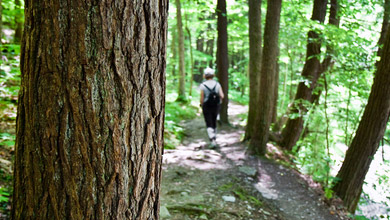Hiking safety
Hiking is a great form of exercise and can be a great outdoor event for friends and family. Recently, there have been many reports of hikers being lost or injured. Do you know what to do in a hiking emergency?

Hiking is generally not considered a dangerous activity. There are times, however, that you may find yourself a long way from "civilization" and an injury or something else could occur. In order to keep your hiking safe, the RCMP would like hikers to consider the following safety tips:
Do not hike alone - This is not always needed, such as when you are taking a short hike through your local park. If you are going to hike into the forest, a canyon or some more hazardous area, you should never go alone. Hiking with a partner has many advantages. You are less likely to become anxious when confronted with a problem or setback. You can also assist each other on getting up steep inclines or across streams that could prove dangerous if you were alone. There is also the consideration that if one of you gets injured, the other will be there to help or get help.
Plan ahead - Before you leave, plan ahead. Make sure you know as much as you can about the area you will be hiking. Study the latest guidebooks and maps. Make sure you check the weather for the area on the planned day of the hike.
Leave word of your destination and schedule - This is very important. This can help in locating you in an emergency. Make sure you tell someone where you are going and when you should be back.
Exercise common sense - Do not get over-confident when on the trail and do things that are risky or foolish. Do not take risky chances that could turn your hike deadly.
Dress appropriately - Make sure you dress for the season and wear the right hiking shoes or boots. Layered clothing is the best to meet changing weather conditions. If cool or wet conditions are expected, it is recommended that you avoid cotton clothing, which insulates poorly when wet and dries slowly.
Take along the right equipment - A day pack containing rain gear, extra warm clothing, high energy food, water, first aid kit, pocket knife, matches in a waterproof container, and insect repellent are recommended. A flashlight or pen light and a GPS unit proved useful in locating a lost hiker recently.
If you get lost, keep calm, stay dry, keep warm and if possible stay put. If you have to stay overnight, build a campfire for warmth, light, and safety. Most dangerous wild animals will not go near campfires. If an aircraft is used in a search, the smoke of a campfire can be spotted. If the weather is cold or bad and you must spend the night there, also build a small shelter. You can use dead branches, hemlock boughs and leaves. This will shelter you from the elements. Set up camp before darkness falls if possible. If you feel you can find your way out of the woods, remember that following a stream downhill will usually lead you back to an inhabited area.
In any given year, Search and Rescue groups in BC respond to nearly 1000 incidents involving over 1300 missing (lost) or injured persons. Search and Rescue have 2500 unpaid professional volunteers, located in more than 80 BC communities available day and night. Together these men and women donate over 100,000 hours of their time on call-outs annually, and an astounding 95% of subjects were found or rescued within the first 24 hours of a volunteer SAR group being activated. This volunteer service offers tremendous value for citizens and visitors alike. The cost to replace this volunteer service in direct salary dollars alone would exceed $5,000,000 annually (excluding infrastructure and capital costs, which are estimated at over 50 million dollars).
- Date modified: